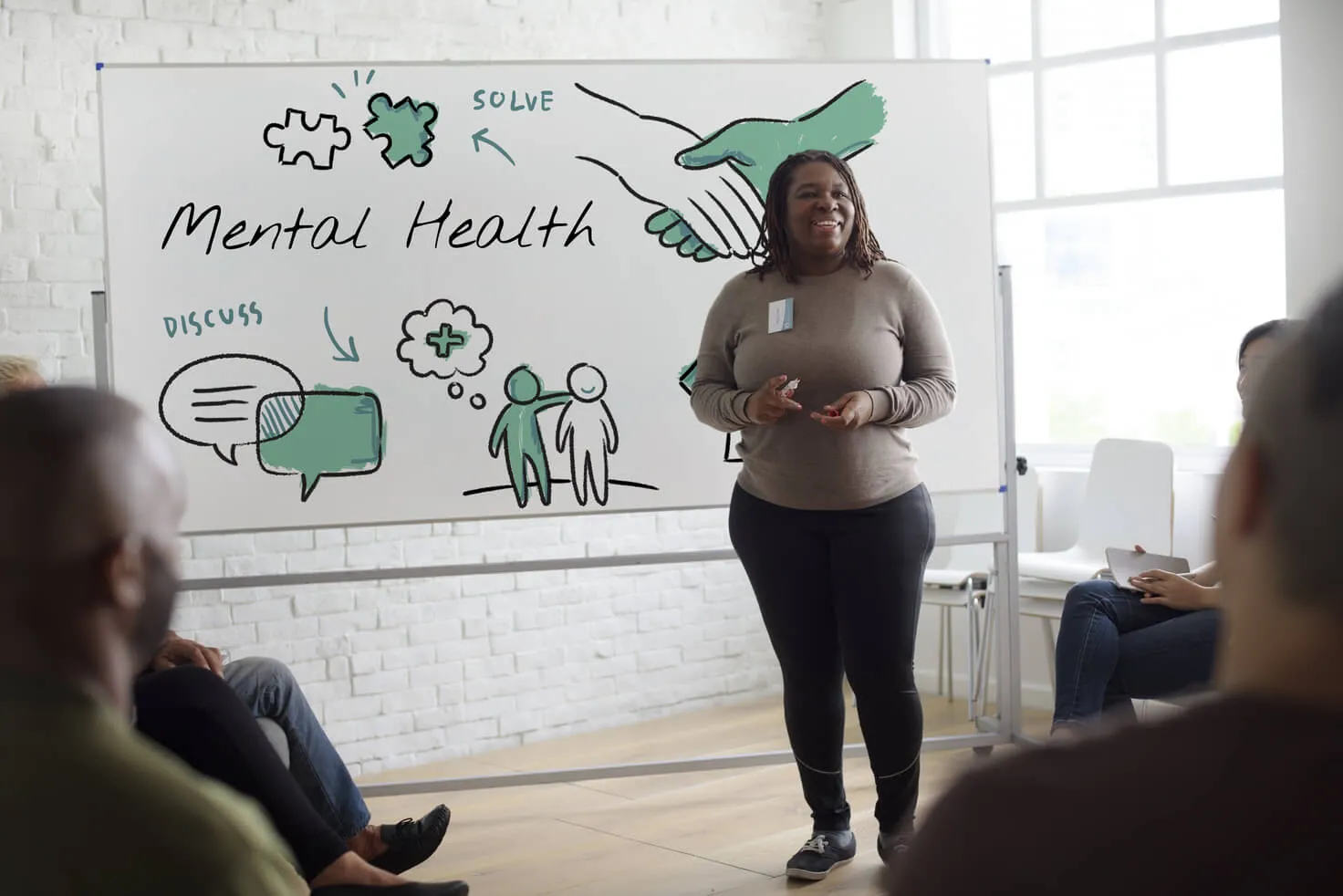What Can You Do With a Mental Health Counseling Degree?

There’s a growing need for mental health counselors here in the United States. Over the last few decades, more Americans received services through mental health counseling to learn techniques and behavioral changes that help them navigate emotions, implement healthier habits, and change perspectives to improve their overall quality of life. In recent years, more Americans have also been receptive to receiving therapy, and 47 percent of Americans polled in a recent survey said that the stigma surrounding mental health services has decreased. A recent report shows that those aged 18 to 44 are most likely to receive treatment, especially women. The declining stigma and changing generational attitude toward mental health treatment are positive steps toward improving mental health outcomes nationally.
However, the burgeoning demand for mental health services also highlights the shortage of mental health professionals in the United States. The Substance Abuse and Mental Health Services Administration estimates that by 2025, the U.S. will see a shortage of marriage and family therapists (40,350 needed), psychiatrists (60,620 needed), mental health counselors (172,630 needed), school counselors (321,500 needed), and others.
Those interested in a career in mental health counseling are essential to further improve access to mental health services across the country.
How Mental Health Counselors Are Shaping Mental Health in the United States
Mental health is a reasonable indicator of a country’s well-being. Mental health healthcare services have come a long way and still have a distance to go. Studies show that U.S. adults are among the most likely to seek mental health treatment when experiencing distress, compared to 11 other high-income countries. Despite this good news, Americans are among the most likely to report difficulty accessing affordable and available mental health care.
Access issues often correlate with the supply of mental health care workers. Only one-third of primary care practices in the United States have mental health professionals on their teams. This percentage is considerably low compared to other high-income countries like Sweden and the Netherlands, where 90% of primary care units report staffing adequate mental health professionals.
Despite current shortages, with proper resources, mental health treatments are associated with positive outcomes for Americans of all ages. Research shows that 75% of individuals who engage in psychotherapy see related benefits, including symptom relief and a renewed ability to function in their everyday lives.
It’s unmistakable that the pandemic affected Americans’ mental health. Dr. Elinor Bock, founder and director of Therapists of New York, says that throughout the pandemic, more people found themselves asking, “Who am I? What do I want to do? Where do I want to be? What job do I want? Is this meaningful enough?” Dr. Bock recognizes that the uneasiness prompted by the pandemic has further destigmatized mental health treatment.
She also highlights that the representation of therapists in popular media, including among TV personalities, athletes, and musicians, continues to weave therapy into American culture. In addition, mental health counselors continue to advocate for the widespread acceptance of life-enhancing and even life-saving treatments to all populations.
Clinical Mental Health Counseling as a Career
Can a career in mental health counseling make a difference in the current landscape? Absolutely. Mental health counselors are essential in advancing the well-being of Americans, and more educated, trained counselors can help deliver more comprehensive, equitable access to services. If you’re curious about the career outlook for individuals with a clinical mental health counselor degree, discover the job outlook, salary options, and opportunities available.
Job Outlook
According to the U.S. Bureau of Labor Statistics (BLS), the demand for mental health counselors is positive and will see a 22% growth rate from 2021 through 2031. This job outlook is much faster than the average forecast for all other occupations.
Annual Salary
The annual salary for mental health counselors varies based on the employer, industry, geographic location, and professional experience. According to the U.S. BLS, the median yearly wage for mental health counselors is a five-figure salary. Mental counselors employed by the government typically earn the highest median salary.
Job Opportunities
There are many different job opportunities for mental health counselors. One of the benefits of working in mental health care is improving the lives of populations wherever they seek treatment, from schools and workplaces to hospitals and residential facilities. According to the U.S. BLS, there will be approximately 43,600 job openings in substance abuse, behavioral disorder, and mental health counselor roles available on average each year over the decade.

Where do Mental Health Counselors Work?
Given the diversity of the role, there is not one expected work environment for mental health counselors. For example, some mental health counselors may concentrate on substance abuse and work in inpatient or outpatient treatment centers. Others may focus on child and youth mental health and work in school settings to deliver counseling services. In the United States, mental health counselors work in five main settings.
- 19% work in outpatient mental health and substance abuse centers
- 15% work in individual and family services
- 10% work in hospitals; state, local, and private
- 9% work in residential mental health and substance abuse facilities
- 8% work in the government
What Are the Typical Roles and Responsibilities of a Mental Health Counselor?
As previously mentioned, mental health counselors work in various settings, and as a result, they take on unique roles and responsibilities to adapt to their patients and work environment. Despite variance, all mental health counselors help clients improve their mental health through support, advocacy, prevention, and treatment plans. The most common responsibilities of mental health counselors include the following:
- Assessing and diagnosing clients’ current mental states
- Outlining treatment objectives, goals, and plans for clients
- Helping clients develop healthier coping mechanisms, skills, and behavioral responses to modify their habits and behaviors
- Identifying common triggers or challenges that inhibit clients’ success
- Psychological testing
- Alcoholism and substance abuse treatment
- Crisis management
- Psychotherapy
- Administering solution-focused therapy
- Group counseling
- Keeping records of progress and outcomes
- Providing clients with helpful educational resources, support networks, and tools
- Educating clients, families, and the general public about mental health
- Building transitional plans that allow clients to bridge the gap between treatment and their in-person experiences
- Participating in outreach programs that improve awareness, equity, and access to mental health treatments
What Skills Do You Need to Work as a Mental Health Counselor?
Master’s and doctoral mental health counseling degrees cover both theory and practical applications to produce well-rounded counselors. Counselors also need essential interpersonal and communication skills to give their patients the best experience and chance for positive outcomes. Skills like active listening, self-awareness, boundary-setting, empathy, interpretation, and trustworthiness are all necessary to ensure clients feel seen, heard, supported, and understood.
Those with a mental health counseling degree learn the foundational skills needed to become successful counselors. A degree in mental health counseling allows students to complete courses that cover counseling theories, therapeutic techniques, best practice, and consultation. Students also learn about crisis intervention, family, marriage, and couples counseling, career development, psychopathy, human growth and development, multicultural competencies, counseling ethics, and more.
What Must One Consider Before Becoming a Mental Health Counselor?
If you’re contemplating becoming a mental health counselor, consider further researching the job requirements, expectations, and educational pathways to make your desired career a reality. Enrolling in a mental health counseling program and earning your degree is a financial and time investment. Still, it allows you to improve people’s lives, find a deeper purpose in your career, and contribute to an essential movement in the mission to better mental health outcomes for people from all backgrounds and life experiences.
Become a Licensed Mental Health Counselor With American International College
American International College (AIC) has helped students learn practical skills to advance their careers for over a century. AIC offers two graduate-level counseling programs for aspiring counselors, including the MA in Clinical Mental Health Counseling and the EdD in Mental Health Counseling.
The MA in Clinical Mental Health Counseling program is based on a comprehensive curriculum intended to produce clinicians trained in theory, research, and clinical skills. The program offers flexible enrollment options and no campus travel, making it an ideal choice for working professionals. To apply for this program, students must have a bachelor’s degree in any field. Upon completion, students enter the counseling field as licensure eligible and may go on to obtain their licensure once meeting post-grad requirements and work as clinicians in mental health and social service agencies, hospitals, clinics, and schools.
AIC’s Doctorate in Mental Health Counseling (EdD) helps students develop their understanding of modern counseling and psychotherapeutic interventions, strategies, clinical skills, remediation, and consultation. Additionally, the program equips students with hard skills in assessment, diagnosis, case conceptualization, and treatment planning and soft skills in personal and interpersonal competencies. Students interested in pursuing the EdD degree must have a master’s degree in psychology or a closely related field. With this degree, students can work as practitioner-educators to advance the pedagogy and practice of counseling and train the next generation of mental health counselors. Upon completion, students enter the counseling field as licensure eligible, and may go on to obtain their licensure and certification once meeting post-grad requirements.
Learn more about how you can launch your mental health counseling career with AIC’s flexible online programs.
